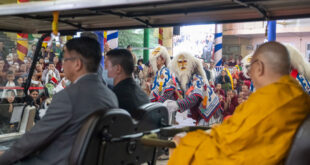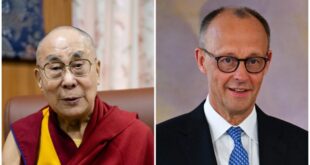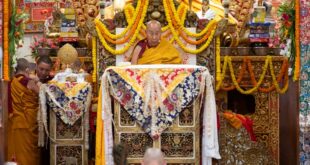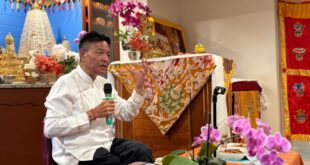Charlottesville: As part of his ongoing official tour of the United States, Sikyong Penpa Tsering visited the city of Charlottesville on Saturday, 3 May 2025 (EDT), where he met with members of the local Tibetan community.
The gathering began with a briefing of the Tibetan Association of Charlottesville’s annual report by its President, Dhondup Dolma.
During his address, Sikyong Penpa Tsering highlighted the importance of unity among Tibetans, both in diaspora and inside Tibet. He reiterated the Central Tibetan Administration’s unwavering commitment to advocating for the Tibetan cause, reassuring the community that sustained efforts are underway to maintain and strengthen bipartisan support in the U.S. Congress.
In bringing the discussions surrounding the objectives of the Central Tibetan Administration (CTA), significant attention has been given to the achievements of the past Kashags and the vision of the current Kashag. The past Kashag’s tireless efforts and steadfast dedication laid a strong foundation for the continued struggle for Tibetan freedom, preservation of Tibetan identity, and strengthening of democratic governance within the exile community. “These contributions have left a lasting impact—not merely administratively, but in the collective memory of the Tibetan people.”
Sikyong underlined the importance of preserving the Tibetan language and culture, pointing out that Tibetan is one of the world’s oldest languages, with a history that spans over a thousand years. While there are many forms of Buddhism practised around the world, Tibetan Buddhism is especially significant because it served as a repository vast collection of ancient religious texts and scriptures of Nalanda tradition. “During the decline of Buddhism in India between the 8th and 13th centuries, many original Buddhist scriptures were translated from Pāli into Tibetan, helping to safeguard the teachings for future generations,” remarked Sikyong.
However, Sikyong expressed his concerns that the Tibetan language, culture, religion, environment, and even the everyday lives of the Tibetan people are all under threat as the CCP intensifies its efforts in systematic eradication of these aspects. As Tibetans living in exile, Sikyong said, “it is our collective responsibility to safeguard and preserve these vital aspects of our identity.” Sikyong further added that he often encourages the younger generation to learn and speak the Tibetan language, noting that its historical significance alone shows how important it is to preserve. One of the main reasons, he pointed out, is that within Tibet itself, learning the Tibetan language is heavily restricted.
Furthermore, Sikyong highlighted the importance of youth engagement as a central goal of the 16th Kashag recognising the vital role young Tibetans play in preserving the identity and future of the movement, Sikyong emphasised that the Kashag is working to build closer relationships with students and youth groups to raise awareness about the Tibetan cause and their role in shaping it.
“During my visit to the Tibetan settlement in India, I especially expressed my foremost gratitude to the older generations of Tibetans. Though they were not educated, they were fully committed to doing everything under His Holiness’ guidance. The early times in exile were the hardest, marked by a lack of necessities, no proper food, and, tragically, some people lost their lives due to harsh weather conditions.”
Regarding the ongoing Tibet-China conflict, Sikyong emphasised, “Rather than framing Tibet’s struggle narrowly, it must be place within the broader international issue as Sino-Tibet conflict so that it would help garner clearer global understanding and support.”
Before concluding, Sikyong also spoke on the significance of the Middle Way Approach in finding mutually beneficial and peaceful resolution to the Tibet-China conflict and reflected on His Holiness the 14th Dalai Lama’s recent book “A Voice for the Voiceless”.
Following that, the Association’s Vice President Geshe Damchoe delivered concluding remarks.
Throughout this official engagements, Sikyong was accompanied by Tshering Doma, Secretary of the Office of Tibet, D.C.














